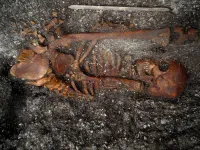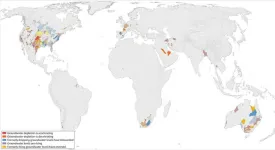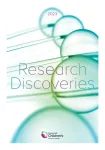(Press-News.org) Like humans, mice live in complex social groups, fight over territory and mates, and learn when it is safer to avoid certain opponents. After losing even a brief fight, the defeated animals will flee from the mice that hurt them for weeks afterward, a new study shows.
Led by researchers at NYU Grossman School of Medicine, the study reveals that such “retreating behavior” is influenced by a distinct area on the underside of the hypothalamus, a part of the brain that controls hunger, sleep, and levels of many hormones. The team had previously found that this special region, called the anterior ventrolateral part of the ventromedial hypothalamus (aVMHvl), helps rodents defend themselves against bullies’ attacks. Here, the authors further identified a central role of the area to drive longer-lasting avoidance after being defeated.
The study showed that when rival mice first meet, scent information about opponents is not strong enough to activate aVMHvl cells to prompt a retreat. Once a fight begins, however, pain (such as from getting bitten) triggers the release of the “cuddle hormone” oxytocin. While this signal has long been linked with parenting and attraction, in this case it binds to oxytocin receptors on aVMHvl cells and signals danger. This process links pain signals to the opponent’s scent so the next time the aggressor approaches, its smell alone encourages the bullied mouse to stay away, say the study authors.
“Our findings provide new insight into how oxytocin within the hypothalamus drives learning from traumatic social experiences,” said study lead author Takuya Osakada, PhD. “While the hormone is often associated with positive behaviors like caregiving, our study highlights its key role in social conflict,” adds Osakada, a postdoctoral fellow in the Departments of Psychiatry and Neuroscience and Physiology at NYU Langone Health.
The study team, while cautioning that mice share a lot of brain chemistry with people but are not the same, says previous research has shown similar “retreat” behavior following social defeat in many species including humans. In addition, past studies in children have linked the experience of being bullied to increased social isolation and school absences.
Osakada notes that while previous research had examined rodent behavior over time after experiencing repeated defeats, the new study, publishing online Jan. 24 in the journal Nature, is the first to explore rapid social learning that occurs immediately after losing a fight.
For the research, the study team observed hundreds of mice that were exposed to a rival for 10 minutes before being separated. They also measured the animals’ brain activity before and after a conflict. The results showed that 24 hours after losing a single fight, social interaction dropped down to just 20% of pre-defeat levels. In addition, the findings revealed that pain prompted the immediate activation of oxytocin-releasing brain cells located right next to the aVMHvl.
To further examine the role of the aVMHvl in social avoidance, the researchers prevented receptors on these cells from binding to oxytocin. They found that rodents with blocked oxytocin receptors were less likely to retreat from their aggressor in later encounters. Meanwhile, when the team instead artificially activated aVMHvl cells, animals kept to themselves even if they had not lost a fight.
“Now that we have a better understanding of critical forces behind social avoidance, researchers can start exploring ways to harness oxytocin to treat disorders that affect social skills, such as autism, social anxiety, and attention-deficit hyperactivity disorder,” said study senior author Dayu Lin, PhD. Lin is a professor in the Departments of Psychiatry and Neuroscience and Physiology at NYU Langone, as well as a member of its Neuroscience Institute.
That said, Lin cautions that while the team connected the aVMHvl to social avoidance, they found no such link to another behavior exhibited by defeated mice — freezing up in the face of conflict. As a result, researchers say additional brain systems are likely involved in defeat behavior, and understanding such systems is essential before developing oxytocin-based therapies for human social disorders.
The study team next plans to examine whether the newly uncovered aVMHvl mechanism may also be involved in behaviors that rodents use to establish their social hierarchy under more natural conditions, instead of during the contrived scenario from the initial experiment.
Funding for the study was provided by National Institutes of Health grants U19NS107616, R01MH101377, R01MH124927, and R01HD092596. Further funding was provided by the Mathers Foundation, the Vulnerable Brain Project, the Uehara Memorial Foundation, the JSPS Overseas Research Fellowship, and the Osamu Hayaishi Memorial Scholarship.
In addition to Osakada and Lin, other NYU Langone researchers involved in the study were Rongzhen Yan, PhD; Yiwen Jiang, MS; Dongyu Wei, PhD; Rina Tabuchi; Bing Dai, BS; Xiaohan Wang, PhD; Richard Tsien, PhD; and Adam Mar, PhD.
Media Inquiries:
Shira Polan
Phone: 212-404-4279
shira.polan@nyulangone.org
END
Brain mechanism teaches mice to avoid bullies
Findings may offer insight into social disorders like autism
2024-01-24
ELSE PRESS RELEASES FROM THIS DATE:
New tool reveals gene behavior in bacteria
2024-01-24
Bacterial infections cause millions of deaths each year, with the global threat made worse by the increasing resistance of the microbes to antibiotic treatments. This is due in part to the ability of bacteria to switch genes on and off as they sense environmental changes, including the presence of drugs. Such switching is accomplished through transcription, which converts the DNA in genes into its chemical cousin in mRNA, which guides the building of proteins that make up the microbe’s structure.
For this ...
Chemists use the blockchain to simulate over 4 billion chemical reactions essential to the origins of life
2024-01-24
Cryptocurrency is usually “mined” through the blockchain by asking a computer to perform a complicated mathematical problem in exchange for tokens of cryptocurrency. But in research appearing in the journal Chem on January 24, a team of chemists have repurposed this process, asking computers to instead generate the largest network ever created of chemical reactions which may have given rise to prebiotic molecules on early Earth.
This work indicates that at least some primitive forms of metabolism might have emerged without the involvement of ...
Fracture risk among living kidney donors 25 years after donation
2024-01-24
About The Study: This survey study found a reduced rate of overall fractures but an excess of vertebral fractures among living kidney donors compared with controls after a mean follow-up of 25 years. Treatment of excess vertebral fractures with dietary supplements such as vitamin D3 may reduce the numbers of vertebral fractures and patient morbidity.
Authors: Rajiv Kumar, M.B.B.S., of the Mayo Clinic in Rochester, Minnesota, is the corresponding author.
To access the embargoed study: Visit our For The Media website at this link https://media.jamanetwork.com/
(doi:10.1001/jamanetworkopen.2023.53005)
Editor’s ...
Contrasting characteristics and outcomes of sports-related and non–sports-related traumatic brain injury
2024-01-24
About The Study: In this study of 4,360 patients with traumatic brain injury (TBI), functional limitations six months after injury were common after sports-related TBI, even mild sports-related TBI. Persisting impairment was evident in the sports-related TBI group despite better recovery compared with non–sports-related TBI on measures of mental health and post-concussion symptoms. These findings caution against taking an overoptimistic view of outcomes after sports-related TBI, even if the initial injury appears mild.
Authors: Lindsay Wilson, ...
Syphilis-like diseases were already widespread in America before the arrival of Columbus
2024-01-24
Researchers at the Universities of Basel and Zurich have discovered the genetic material of the pathogen Treponema pallidum in the bones of people who died in Brazil 2,000 years ago. This is the oldest verified discovery of this pathogen thus far, and it proves that humans were suffering from diseases akin to syphilis – known as treponematoses – long before Columbus’s discovery of America. The new findings, published in the scientific journal Nature, call into question previous theories concerning the spread of syphilis ...
Global groundwater depletion is accelerating, but is not inevitable
2024-01-24
(Santa Barbara, Calif.) — Groundwater is rapidly declining across the globe, often at accelerating rates. Writing in the journal Nature, UC Santa Barbara researchers present the largest assessment of groundwater levels around the world, spanning nearly 1,700 aquifers. In addition to raising the alarm over declining water resources, the work offers instructive examples of where things are going well, and how groundwater depletion can be solved. The study is a boon for scientists, policy makers and resource managers working to understand global groundwater dynamics.
“This study was driven by curiosity. We wanted to better understand the state of global ...
Targeted scientific research projects to demonstrate effectiveness of ‘food is medicine’ in health care
2024-01-24
DALLAS, Jan. 24, 2024 — In an effort to identify effective food is medicine approaches for incorporating healthy food into health care delivery, the American Heart Association, the world’s leading voluntary organization focused on heart and brain health research, now celebrating 100 years of lifesaving work, today announced grants totaling $7.8 million to 19 research projects nationwide as part of its Health Care by Food™ initiative.
The research projects focus on areas including food resource coaching for patients of a safety-net clinic, delivering food is medicine interventions ...
Mass General Cancer Center announces first recipients of Krantz Awards for Cancer Research
2024-01-24
The Krantz Family Center for Cancer Research at the Mass General Cancer Center today announced the selection of 17 scientists who have been awarded a combined $6 million in funding. These competitive awards, which will be granted annually, were established to recognize the trailblazing efforts of Krantz Center scientists and accelerate ideas, projects and initiatives with the potential to fundamentally change how cancer is diagnosed and treated.
Philanthropists Jason and Keely Krantz, who ...
A large percentage of European plastic sent to Vietnam ends up in nature
2024-01-24
Despite strict EU regulations on plastic recycling, there is little oversight on plastic waste shipped from the EU to Vietnam. A large percentage of the exported European plastic cannot be recycled and gets dumped in nature. That is what new research led by Utrecht University’s Kaustubh Thapa has found.
Following the recycling path
About half of Europe’s plastic waste is exported to a number of countries in the Global South, including Vietnam. A Dutch and Vietnamese research team ventured to Minh Khai Craft Village, the largest recycling hub ...
A year of breakthroughs from Cincinnati Children’s
2024-01-24
Cincinnati Children’s continues to be a cradle for great discoveries.
Our latest Research Annual Report, online now, recounts a remarkable year of scientific advancement supported by a record-high level of research funding from federal, state, industry and philanthropic sources.
Among the many accomplishments from more than 1,000 faculty working in 50 research areas:
Promising results from the world’s first clinical trial of FLASH proton therapy for cancer treatment
Developing the first intestine organoids with functional immune cells, a major step closer to testing potential treatments using these amazing lab-grown tissues
Completing ...
LAST 30 PRESS RELEASES:
Women may face heart attack risk with a lower plaque level than men
Proximity to nuclear power plants associated with increased cancer mortality
Women’s risk of major cardiac events emerges at lower coronary plaque burden compared to men
Peatland lakes in the Congo Basin release carbon that is thousands of years old
Breadcrumbs lead to fossil free production of everyday goods
New computation method for climate extremes: Researchers at the University of Graz reveal tenfold increase of heat over Europe
Does mental health affect mortality risk in adults with cancer?
EANM launches new award to accelerate alpha radioligand therapy research
Globe-trotting ancient ‘sea-salamander’ fossils rediscovered from Australia’s dawn of the Age of Dinosaurs
Roadmap for Europe’s biodiversity monitoring system
Novel camel antimicrobial peptides show promise against drug-resistant bacteria
Scientists discover why we know when to stop scratching an itch
A hidden reason inner ear cells die – and what it means for preventing hearing loss
Researchers discover how tuberculosis bacteria use a “stealth” mechanism to evade the immune system
New microscopy technique lets scientists see cells in unprecedented detail and color
Sometimes less is more: Scientists rethink how to pack medicine into tiny delivery capsules
Scientists build low-cost microscope to study living cells in zero gravity
The Biophysical Journal names Denis V. Titov the 2025 Paper of the Year-Early Career Investigator awardee
Scientists show how your body senses cold—and why menthol feels cool
Scientists deliver new molecule for getting DNA into cells
Study reveals insights about brain regions linked to OCD, informing potential treatments
Does ocean saltiness influence El Niño?
2026 Young Investigators: ONR celebrates new talent tackling warfighter challenges
Genetics help explain who gets the ‘telltale tingle’ from music, art and literature
Many Americans misunderstand medical aid in dying laws
Researchers publish landmark infectious disease study in ‘Science’
New NSF award supports innovative role-playing game approach to strengthening research security in academia
Kumar named to ACMA Emerging Leaders Program for 2026
AI language models could transform aquatic environmental risk assessment
New isotope tools reveal hidden pathways reshaping the global nitrogen cycle
[Press-News.org] Brain mechanism teaches mice to avoid bulliesFindings may offer insight into social disorders like autism



